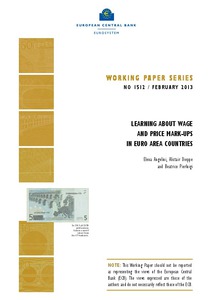Learning about wage and price mark-ups in euro area countries
"In this paper we show that higher flexibility, measured by lower wage and price mark-ups leads to reduced inflationary pressures, increase in competitiveness, and higher output. A rational expectation and a learning version of the ECB’s New Multi-Country Model are used to understand plausible...
| Main Authors: | , , |
|---|---|
| Institution: | ETUI-European Trade Union Institute |
| Format: | TEXT |
| Language: | English |
| Published: |
Frankfurt am Main
2013
ECB |
| Subjects: | |
| Online Access: | https://www.labourline.org/KENTIKA-19129255124919474379-Learning-about-wage-and-price-.htm |
| Summary: | "In this paper we show that higher flexibility, measured by lower wage and price mark-ups leads to reduced inflationary pressures, increase in competitiveness, and higher output. A rational expectation and a learning version of the ECB’s New Multi-Country Model are used to understand plausible dynamics of labour cost and price adjustments. In the rational expectation version of the model gains are quicker but more short-lived than in a learning environment. We argue that a rational expectation model appears appropriate to describe the abrupt wage adjustment which took place in the Baltic States. By contrast, a learning model appears better suited to capture the gradual wage adjustment of Germany during the 2000s and the one that started in Spain and Italy after the 2008-09 crisis. In fact, in view of implementation lags and the need to change institutions, in the above countries the adjustment should be expected to deliver output gains less quickly than in the Baltic States. In this paper we use the linked version of the model to evaluate the aggregate impact of the imposed shocks as well as possible spillover effects within the euro area. All in all, spillover effects are relatively small." |
|---|---|
| Physical Description: | 29 p. Digital |

